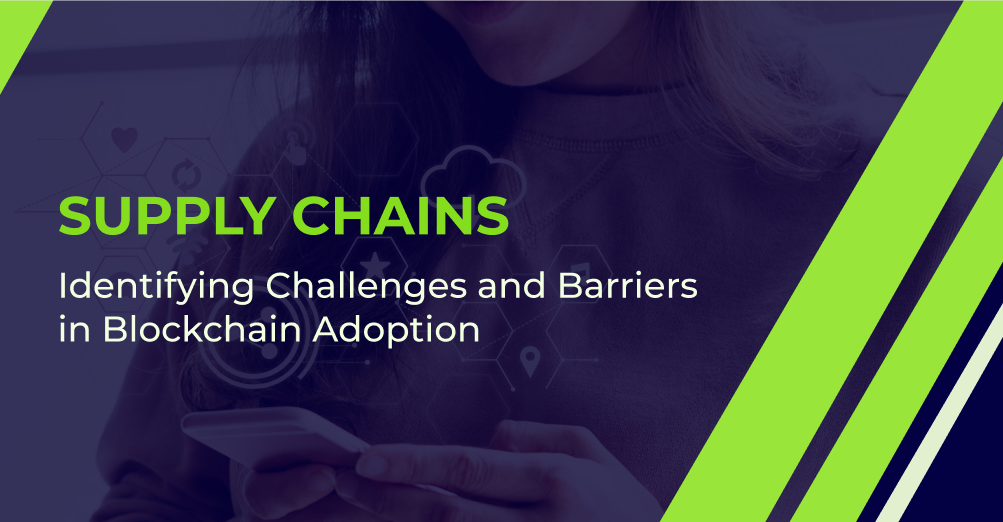
Adoption of blockchain technology is a topic garnering much attention from both scholars and industry insiders, with the potential to revolutionize supply chains across various sectors such as agriculture, food, health, and manufacturing. This transformative technology promises improvements in transparency, traceability, and eco-friendly practices. However, the adoption of blockchain has been slow, primarily due to numerous obstacles and challenges.
In this article, we critically examine these hurdles and discuss the crucial success factors for the adoption of blockchain technology in economically sustainable supply chains.
Identifying Challenges and Barriers in Blockchain Adoption
The adoption of blockchain faces various challenges and barriers, ranging from the agricultural and food sectors to manufacturing, maritime industry, and small and medium enterprises, impacting both local and global supply chains. Researchers have employed diverse methodologies like decision-making trial and evaluation laboratory (DEMATEL), analytic hierarchical process, fishbone diagrams, and PESTLE analysis, to identify and rank these barriers.
Most of these barriers are classified into technical, organizational, and environmental categories. Technological immaturity, poor organizational policies, and lack of governmental regulations are the primary obstacles according to data collected by Farooque et al. (2020) from Chinese organizations that have attempted blockchain implementation. Furthermore, lack of integration in the health system, coordination among stakeholders, and inadequate demand forecasting are some of the major issues identified within the pharmaceutical industry (Alharthi et al., 2020).

Future Directions: Model Development for Sustainable Adoption of Blockchain
The future of the adoption of blockchain in supply chains is centered around developing a model or framework that takes into account all dimensions of sustainability: social, economic, and environmental. The model must be empirically validated across multiple sectors to reach a universal conclusion. Future frameworks should consider integration with other technologies for data collection like the Internet of Things, QR codes, RFID, and artificial intelligence.
Blockchain-based Green Supply Chain Management
In an era of increasing environmental consciousness, a sustainable supply chain is not just a luxury but a necessity. It aims at efficiently managing the flow of resources and information from supplier to end-customer while also considering financial, societal, and environmental performances. Blockchain technology is helping manage carbon emissions in different countries by creating transparent, traceable, and efficient green or circular supply chains.
Models, Frameworks, and Case Studies in Blockchain-based Green Supply Chains
Blockchain is increasingly being recognized as a tool for environmental sustainability. Researchers have developed various models, architectures, and frameworks across sectors such as waste management, fashion, food, and agriculture. Bai et al. (2021) proposed a green supply chain framework based on a non-cooperative game, while Manupati et al. (2019) created a model optimizing carbon emission levels and operational costs. Casado-Varaa et al. (2018) presented an agricultural supply chain model using blockchain, which made traceability possible at all stages.
The adoption of blockchain for green/circular supply chains comes with its own set of challenges. A crucial success factor in this respect is customer awareness. Environmentally conscious consumers prefer green products, providing a compelling case for manufacturers to adopt blockchain. However, challenges like procurement and manufacturing barriers persist. These need to be addressed for successful adoption of blockchain, helping us move towards a more sustainable and economically viable future with blockchain.
The Role of Blockchain in Carbon Reduction Policies
The adoption of blockchain can help address one of the most pressing issues of our time – carbon emissions. Its unique characteristics like traceability and smart contracts are highly beneficial for monitoring, controlling, and reducing carbon footprints during various stages of the supply chain. For instance, in Northern Europe, blockchain is being employed to incentivize people with financial rewards in exchange for depositing recyclable plastic bottles or cans. The potential for blockchain to ensure proper traceability of products and improve resource efficiency could significantly contribute to developing a sustainable and closed-loop supply chain.
In addition to blockchain, emerging technologies such as the Physical Internet (PI) can further enhance supply chain sustainability by restructuring the entire supply chain. Utilizing these technologies in conjunction can result in optimized carbon emissions levels and operational costs, thus bolstering the transition from disposable to reusable goods – a crucial step towards a more sustainable economy.
Moreover, researchers are building frameworks around using blockchain for waste management, circular supply chains, and the implementation of carbon reduction policies. Blockchain can also be instrumental in sectors like the fashion industry and agriculture, where transparency, traceability, and accountability are key to sustainable operations.
Blockchain for Green Supply Chains: Case Studies and Theoretical Developments
Incorporating sustainable practices can enable firms to mitigate negative environmental and social effects in their supply chains. The integration of blockchain, big data, and artificial intelligence can enhance sustainability goals associated with traceability, security, environmental degradation, and social ethics.
For instance, Mastos et al. (2021) developed a waste-to-energy model and validated it through three case studies of the wood waste supply chain within the context of Industry 4.0. Ajwani-Ramchandani et al. (2021) proposed a concept of utilizing blockchain for social and environmental sustainability in a circular supply chain. Such case studies and theoretical advancements pave the way for more extensive adoption of blockchain in creating green and circular supply chains.
Awareness and Policy Support: The Path to Success in Adoption of Blockchain
Success in the adoption of blockchain for green/circular supply chains relies heavily on customer awareness and policy support. If manufacturing practices turn green, environmentally conscious customers will be more likely to purchase the product. However, understanding the challenges and barriers during the adoption phase is equally crucial.
For example, one of the biggest hurdles in the procurement sector is the lack of clarity and direction in terms of implementing blockchain. A comprehensive qualitative and quantitative research methodology could help elucidate these challenges.
The adoption of blockchain technology has the potential to dramatically increase the efficiency of supply chains. Its inherent properties such as immutability and transparency make it a powerful tool for tracking and tracing products from the point of origin to the end consumer. This traceability not only reduces the chances of counterfeit products entering the market but also ensures that every stakeholder in the supply chain is held accountable for their actions. Furthermore, with smart contracts, transactions can be automated and streamlined, eliminating the need for intermediaries and reducing operational costs.
Blockchain in the Agriculture and Food Sectors
Blockchain’s potential for transformative impact extends to a variety of sectors, particularly in agriculture and food. Here, it can be used to monitor the journey of food products from the farm to the consumer’s table, enhancing food safety and reducing food fraud. Consumers can easily verify the origin of their food, its safety standards, and its environmental impact. Farmers, on the other hand, can ensure fair compensation as blockchain provides an irrefutable record of their produce and its journey through the supply chain.
The pharmaceutical industry can also greatly benefit from blockchain technology. It can tackle some of the pressing challenges the industry faces such as counterfeit drugs, lack of transparency in clinical trials, and inefficient supply chain management. By offering a secure, immutable ledger, blockchain can help authenticate medicines, ensure the traceability of drugs, and bring transparency to clinical trial data. It can also streamline the supply chain, ensuring timely delivery of medicines and reducing the risk of stockouts.
Navigating Challenges in Adoption of Blockchain
Despite the numerous benefits offered by blockchain, its adoption faces several challenges. Technological immaturity, lack of organizational policies, and insufficient government regulations are significant hurdles. For successful implementation, it is essential to develop a robust technical infrastructure that supports blockchain, formulate clear organizational policies regarding its use, and advocate for government regulations that facilitate blockchain adoption.
The integration of blockchain with other emerging technologies such as the Internet of Things (IoT), AI, and RFID can further amplify its impact. IoT devices can feed real-time data into the blockchain, enhancing its capability to track and trace products accurately. AI can aid in analyzing the vast amount of data collected, providing valuable insights for decision-making. RFID tags can enhance the accuracy of product identification, improving overall supply chain efficiency.
Blockchain for Sustainable Development
The potential of blockchain extends beyond enhancing supply chain efficiency and transparency. It also holds great promise for promoting sustainable development. By enabling green practices such as waste management and carbon footprint reduction, blockchain can play a pivotal role in achieving sustainability goals. With its ability to ensure transparency and traceability, it can hold corporations accountable for their environmental footprint, promoting a culture of responsibility and sustainability.
Future Directions in Adoption of Blockchain
As blockchain technology continues to evolve and mature, it is likely to permeate more areas of supply chain management. Future work should focus on developing models and frameworks that incorporate blockchain technology for various dimensions of sustainability including social, economic, and environmental perspectives. These models should be empirically validated across multiple sectors to draw generalized conclusions.
Research should also explore how blockchain can be integrated with other technologies for enhanced data collection and analysis. In the era of big data, combining blockchain with AI, IoT, and other technologies can provide unprecedented levels of efficiency, transparency, and sustainability in supply chain management.
The Way Forward: Promoting Blockchain for Economic Sustainability
As we look towards the future, the adoption of blockchain for economic sustainability in supply chains is more relevant than ever. The opportunities it presents, be it creating transparent, efficient supply chains, or enabling green practices, can transform the way we view and manage resources.
The adoption of blockchain holds immense potential for revolutionizing supply chain management. By overcoming the barriers to its adoption and leveraging its numerous benefits, we can look forward to more sustainable, efficient, and transparent supply chains in the future.
Addressing the technical, organizational, and environmental barriers to adoption is essential, requiring the collective efforts of industry leaders, policymakers, and consumers. By navigating these challenges, embracing innovation, and fostering collaboration, we can leverage the potential of blockchain technology, creating a more sustainable and economically viable future.
Source: https://www.frontiersin.org/articles/10.3389/fenrg.2022.899632/full
